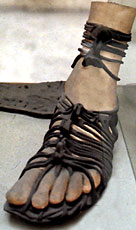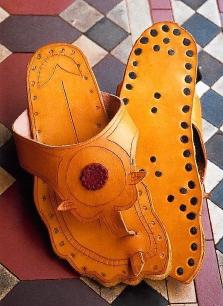Roman Footwear
There was a wide variety of shoes and sandals for men and women. Most were constructed like military caligae, with a one-piece upper nailed between layers of the sole. Many had large open-work areas made by cutting or punching circles, triangles, squares, ovals, etc., in rows or grid-like patterns. Others were more enclosed, having only holes for the laces. Some very dainty women's and children's shoes still had thick nailed soles.
Some shoes had a one- or two-piece upper of soft leather which enclosed the foot like a modern shoe. The edges were nailed between the sole layers. Traditionally, those worn by patricians, senators, and magistrates were called calcei, while common people wore perones. But there is much confusion in terminology and most shoes which have nailed soles and are not caligae or sandals are referred to as calcei. "Calcei senatorii" had soft leather uppers and were secured by wide straps which passed under the foot and crisscrossed up the lower leg. They were red with small ivory crescents attached. Equestrians are shown wearing an identical style, but apparently black in color.
One-piece shoes called carbatinae were shaped like caligae/calcei, but had no outer or inner soles added. Sandals were generally called soleae, and had nailed or stitched soles. It is possible that heavy nailed shoes were for outdoor wear, while lighter sandals and carbatinae were worn "around the house". (Also see Leatherworking Tips.) Besides open-work on the leather, shoes and sandals could be dyed, tooled, embossed, or even have gilded designs.
Socks (udones) were sewn of woven cloth, and could be worn for warmth or as decorative items. In the latter case they would be brightly colored so as to show through the ornate open-work of the shoes, and might leave the toes and heel exposed. Socks worn strictly for warmth were more likely fully closed and not necessarily so colorful
Kinds of shoes
- baxa - a light sandal worn by intellectuals
- carbatina - a shoe made by peasants from a single piece of leather
- caliga - soldier's sandals (cf Caligula)
- cothurnus and crepida - used by the actors.
- pero - boot for agricultural workers
- sandalium - or obstrigilium - women's sandals
- phaecasium - white shoe of eastern priests
- sculponae - clogs
- soccus - slippers without upperwork for indoor wear by both sexes
- solea - slipper with upperwork

